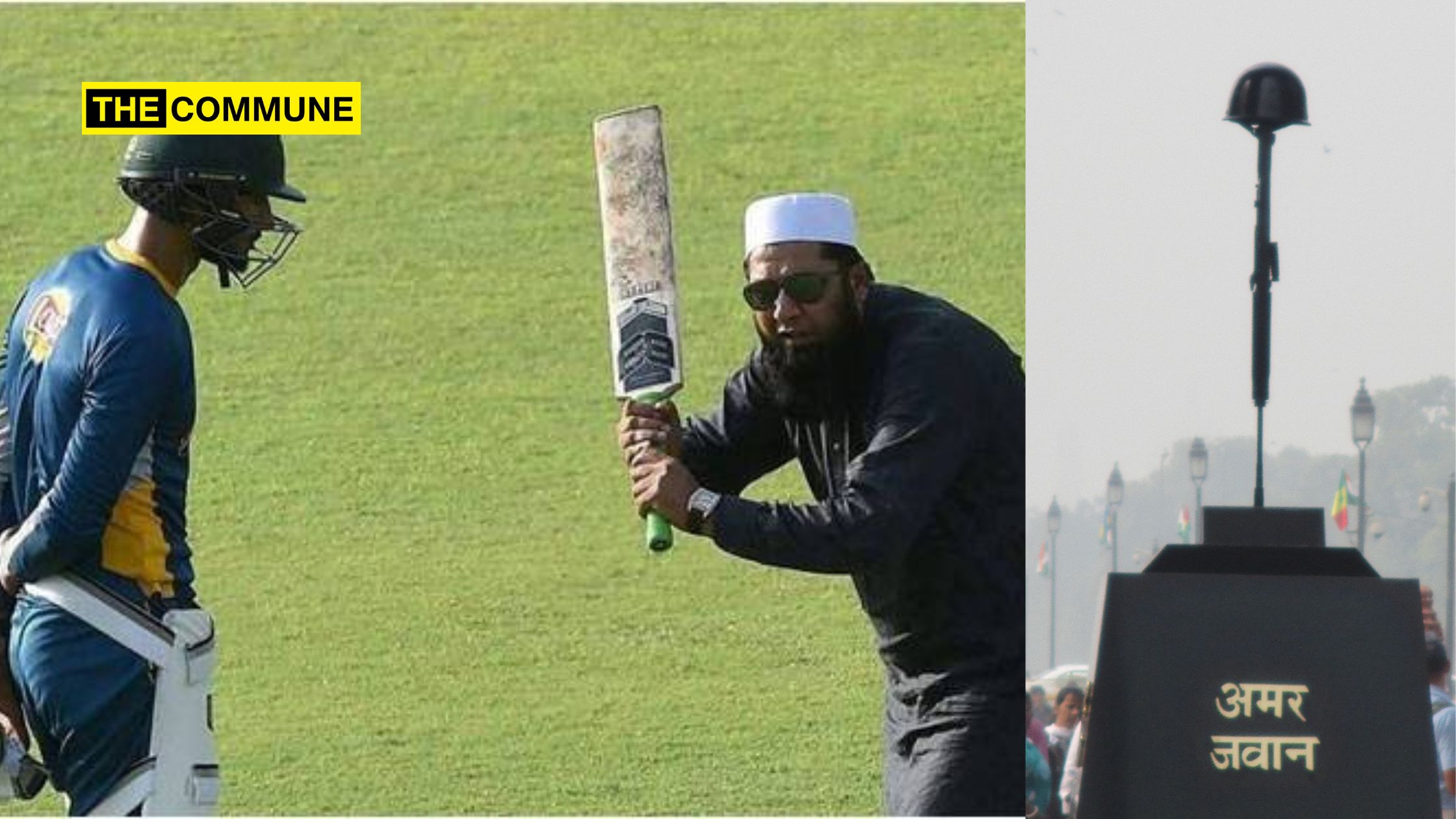
I wholeheartedly endorse BCCI’s refusal to tour Pakistan for the upcoming Champion’s Trophy, which will be held there in 2025. I will go a step further and urge a complete boycott of Pakistan Cricket.
Let me break it down for those still wondering what is wrong with India going to Pakistan to play in the Champion’s Trophy. It is no longer a secret that cricket stopped being a gentleman’s game in Pakistan, especially in the last two decades. Under the influence of the Tablighi Jamaat (TJ), the game has become a medium to promote radical religious ideologies. Pakistan Cricket team players see the sport as a way to influence non-Muslims to convert to Islam and establish the nation’s image as an Islamic power.
Most importantly, Pakistan Cricket players see the game as a way of waging “Jihad” against India and establishing the “victory of Muslims all over the world over Hindus”.
The Jamaat’s grip on the “Shaheens” has been well-known for some time. They made mandatory the display of Islamic symbols in the dressing rooms, namaz for players, and starting every response in front of cameras with “Thanks to Allah almighty”. Cricketers like Danish Kaneria, who didn’t follow the mandate, were conveniently sidelined, and those who bent to the diktat, like Yousuf Yohanna, were allowed to keep their place.
How did this radicalisation begin in Pakistan Cricket?
It isn’t as if religious bigotry among Pakistani cricket players was uncommon before the 2000s.
In a 2009 article titled ‘Of Cricket and Other Demons’ in the Pakistani daily Dawn, Nadeem F. Paracha writes that the indoctrination process was set relatively early in society. He argues that the sixth president of Pakistan, Muhammad Zia-Ul-Haq, decided to radicalise the society so that he could efficiently recruit cheap cannon fodder for the ‘jihad’ in Afghanistan. Paracha writes:
“With the ‘Afghan jihad’ raging against the former Soviet Union, Zia (ul-Haq), his intelligence agencies, and parties like Jamat-i-Islami and Jamiat Ulema-i-Islam started embracing a narrow and highly political version of Islam… Most Pakistanis were historically related to the mazaar and Sufi traditions of the subcontinent and, thus, were least suitable to fight a ‘jihad’ that Zia was planning to peddle in Afghanistan.
Their beliefs were incompatible with Zia or, for that matter, with the late Abul Ala Maududi and Syed Qutb’s versions of Political Islam. To compensate for this ideological ‘deficiency’, the Zia regime sprang up indoctrination centres in the shape of thousands of madrassas. Almost all of them were handed over to radical puritans. These were preachers and ‘scholars’ who had become critical of the strains of faith most Pakistanis adhered to. Accusing these strains of being ‘adulterated’, they fell instead for the assertive charms of the Political Islam.”
Even though the stars of Pakistani cricket back then didn’t display their religion publicly, they were the generation bred on Zia’s radical notions. They were just as zealous in their views about ‘jihad’ for Kashmir or the indoctrination of non-muslims.
The former Indian High Commissioner to Pakistan, G Parthasarathy, recalled meeting Imran Khan when he was the captain of the Pakistan cricket team.
“I first met Imran Khan in 1982 during the tour of the Indian team led by Sunil Gavaskar to Pakistan. We lost the series badly. A Pakistani journalist told me that when he asked Imran how he bowls such fire against India, he said, ‘Whenever I play against India, I don’t treat it as a game. I think of Kashmir and treat it as a jihad’,” he wrote.
In 1978, after his team’s victory against India in a test series, the then Pakistani captain Mushtaq Mohammed went on record saying it was the “victory of Muslims all over the world over Hindus.”
Things took a real turn for the worse in 2001 when the Pakistan Cricket team’s opening batsman, Saeed Anwar, lost his three-year-old daughter, Bismah, after a prolonged illness. He sought solace in religion.
“That is when the volunteers of the Tablighi Jamaat took his hand. They consoled him, guiding him towards the Quran to seek solace in its verses and read up on the companions of the Prophet who had to endure untold hardships. Over time, Anwar came to terms with his grief, finding succour in Surah Al-Imran’s verse 185: ‘He who has taken a breath shall taste death too.’ He was a changed man. Gone was the swagger and worldly attitude. He grew a beard, began to pray five times a day and took it upon himself to explain life’s larger purpose to his teammates. He became a regular at Tablighi Jamaat gatherings, becoming a powerful speaker. When he spoke, people listened in rapt attention. Soon, he came to be seen as the Tabligh’s most important ‘face’ in the country.”
These are excerpts from ‘Inside the Tablighi Jamaat’ by Ziya Us Salam as he provides an inside view of the organisation and its various aspects, especially in the sub-continent.
What is Tablighi Jamaat?
Tablighi Jamaat (The Society of Preachers) is a supremacist Deobandi Islamic missionary group with footprints in over 150 countries. It shares the same goals as the Salafis, Wahhabis and other Islamist movements, i.e., Dar al Islam and establishing a global Caliphate.
TJ focuses on encouraging Muslims to return to practising their religion as it was during the time of their Prophet and give dawah (invitation to convert) to non-Muslims. Members consider music haram, and women observe strict purdah.
Not too long ago, Aamir Khan posed happily with Tariq Jameel, easily the most recognisable face of the organisation headquartered in New Delhi. The organisation takes converts as far as possible from their native non-Muslim roots in the name of “Islamic revivalism.” Even the most elite members of the community in India support it.
They like to work quietly and were primarily unheard of by many Indians until 2020, when a TJ congregation in Delhi’s Nizamuddin Markaz Mosque became a COVID-19 super-spreader event. There were more than 4,000 confirmed cases and at least 27 deaths linked to the event reported across the country.
Consequences of Tablighi Jamaat Influence
Once Anwar began preaching, he became a mouthpiece of Tablighi Jamaat’s ideals. Once, he even said, “All 6 Billion non-Muslims will burn in hell. Let’s save them by converting them to Islam.”
He could significantly influence other players, especially Inzamam-ul-Haq, who admired his captain’s batting skills. Haq, otherwise known to be a mild-mannered and pleasant person, used to get agitated if anyone criticised Tablighi Jamaat. His ideas trickled down to other members when he took over the captaincy in 2004.
Soon enough, bowlers Mushtaq Ahmed and Saqlain Mushtaq were seen sporting Tablighi Jamaat-mandated beards and started sharing things of faith with others. Fast bowler Shoaib Akhtar followed in their footsteps and joined the organisation. He was even seen sermonising, though, without the mandatory beard.
The Islamization of the ‘Men in Green’ became apparent on the field and off-the-field media interactions, too. Haq started using “Bismillah (In the name of Allah)” before all his soundbites and speeches. Players would often pray on the ground before the match. There would be reports of batsmen cramping up because of Ramzan fasting during games.
The dressing room soon became a hub for a conversion racket led by Haq. Check out posts by ‘Pakistan Untold’, where he brags about his attempts at converting other professional players.
While touring in a plane between cities during the 2007 World Cup, Haq reportedly ordered all the players to stand up and say their prayers in the jet’s aisle, even when asked by the cabin crew to remain seated.
In an interview, he proudly shared that batsman Yusuf had even tried to convert Brian Lara to Islam during the Karachi Test match after inviting him for a ‘da’wa’.
Being a Non-Muslim in Pakistan Cricket
This muggy control wielded by Tablighi Jamaat had crushing effects on the non-Muslim team members.
Anwar’s ideas prompted Yousuf Youhana, the only Christian member of the team, to convert to Islam in 2005 and be known as Mohammad Yousuf. Much like other neo-converts, Yousuf was staunch in his beliefs. He reportedly talked about the genocide of non-muslims in Pakistan.
Yousuf said, “If Pakistani Muslims start living as per Islam, there will be no non-Muslims left in Pakistan.”
He had also said, “No non-Muslim can enter Jannat ever. But Allah will send even the worst criminal Muslim to Jannat.”
Instead of calling out his bigotry, his team members encouraged him further. Off-spinner Saqlain Mushtaq claimed that Yousuf’s average doubled because he started following Islam.
On the other hand, Danish Kaneria, the only Hindu player in the team, resisted these ideas and faced the consequences. In a candid admission of Hinduphobia within the team, Shoaib Akhtar spoke about how his teammates maltreated Kaneria over religion.
Without naming the captain, Akhtar also said that Kaneria wasn’t even allowed to pick up food from the same table as others because of his faith.
“Captain would raise eyebrows about him eating with us or taking the food from the same table. I told him you could be the captain, but your conduct is despicable. This guy (Kaneria) is chalking up so many wickets to win matches for us, and you’re treating him like this,” Shoaib Akhtar spoke on a cricket show titled ‘Game on Hai’ on PTV.
The treatment of minorities in the Pakistan team wasn’t a widely reported issue in the local or international press. However, one tragic incident in 2007 opened many cans of worms over TJ’s influence over the team.
Many eyebrows were raised when the team’s coach, Bob Woolmer, was found dead in his room after Pakistan’s embarrassing performance in the 2007 World Cup. The India-born Woolmer was worried about the players’ decline in performance. He attributed this descent to TJ’s growing influence on some cricketers and their consequent indifference to training.
By then, Woolmer and Haq had professional differences in coaching and training methods. Haq led his team to believe that they could win simply by praying. TJ preachers would be allowed to meet players in the hotels during tours, and during such visits, Haq and his men would entirely ignore Woolmer and his instructions.
More than the team’s show of religious affinity, what bothered Woolmer was how Haq gained discipline and submission from the players. This obedience was not on adherence to a professional order but on a follow-or-perish-in-hell code of conduct based on TJ ideals.
On 18 March 2007, Woolmer died suddenly in Jamaica, just a few hours after the Pakistan team’s unexpected elimination at the hands of Ireland in the World Cup. Shortly afterwards, Jamaican police announced that they opened a murder investigation into the case. In November, a jury in Jamaica recorded an open verdict on his death.
The Aftermath
Pakistan Cricket team continues to be a highly radicalised organisation using a radicalised version of the faith to indoctrinate others.
Sporting wins against Team India are now seen as a form of jihad by not just the team but also by Pakistani media and political leaders.
After the team won a T20I match by ten wickets for the first time, Pakistan’s Interior Minister Sheikh Rasheed claimed that all Muslims worldwide, including Indian Muslims, had supported Pakistan during the match. “Pakistan’s triumph against India is a victory of Islam. All Muslims worldwide are rejoicing,” he said in a video on Twitter.
He refused to make such boisterous claims when the New Zealand cricket team called off its Pakistan tour minutes before the first match was due to begin in Rawalpindi, citing security concerns.
Spewing rabid hatred against the Hindus continues to be applauded in the Pakistani media. Former captain and pacer Waqar Younis even said his favourite moment of the match was when Mohammed Rizwan offered namaz on the ground in front of Hindus.
Shahid Afridi boasted about breaking a TV set at home after he saw his young daughter imitate aarti after watching a Star Plus soap. The audience clapped for Afridi’s parenting choices.
In another interview, he said, “They (Hindus in India) can never have large or pure hearts like what Allah has given to us Muslims”.
In an interview, Shoaib Akhtar casually talked about Ghazwa-e-Hind, attacking Kashmir and the rest of India to establish an empire from Attock to Cuttack. The interviewer kept smiling at those comments.
Pakistani cricketers weren’t allowed to participate in the 2010 IPL auction over their government’s inaction over the 26/11 Mumbai terror accused. On a TV show discussion on this BCCI decision, batsman Sohail Tanvir announced, “Hinduon ki zahaniyat hi aisi hai” (Hindus have such nature (back stabbers)’ The hostess responded with “muh mein Ram, bagal mein churi” (Hindus will stab anyone’s back with a knife while chanting the name of Ram). They received good applause from the audience.
Derisively labelling anyone practising Sanatan Dharma as “Hindu Banya” is a common practice in Pakistan. To them, the Hindu is a cunning businessman, unlike the Pakistani Muslim. How this stereotype percolated across the border into Bollywood is, perhaps, a subject for another day.
Pakistani cricketers are so obsessed with spreading Islam that they even support the Taliban and ISIS. When the Taliban took over Afghanistan, they slaughtered many Afghans. To this barbaric act, Afridi took a proud stand, saying, “Taliban love cricket. The Taliban has brought positivity to the world. Taliban are women rights champions.”
Perhaps the Pakistan team will always walk into the ground to wage ‘cricket jihad’ instead of playing professional cricket. In that case, it may be high time for the ICC and BCCI to decide if the team should be allowed to play any future games with other professional bodies.
In Conclusion
Lastly, I am not naive enough to believe that this plague of radicalisation is limited to the Pakistan cricket team alone.
We would be wise to remember that Pakistani cricket’s radicalisation is just a microcosm of its wider society. There is no reason to believe that its tennis, kabaddi, athletic, or hockey teams do not breed such radical elements. In the best interest of all national sporting talents, the government should boycott all interactions with any Pakistani sports body.
Jayasri Viswanathan is a journalist and columnist.
(Subscribe to our channels on Telegram, WhatsApp, and Instagram to receive the best stories of the day personally.)




